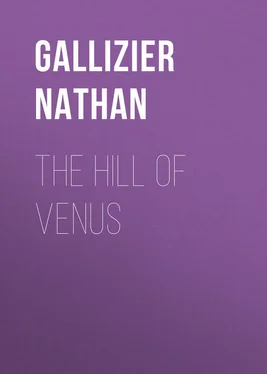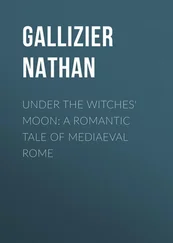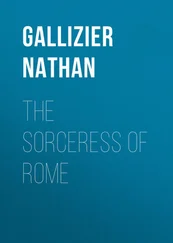Nathan Gallizier - The Hill of Venus
Здесь есть возможность читать онлайн «Nathan Gallizier - The Hill of Venus» — ознакомительный отрывок электронной книги совершенно бесплатно, а после прочтения отрывка купить полную версию. В некоторых случаях можно слушать аудио, скачать через торрент в формате fb2 и присутствует краткое содержание. Жанр: foreign_antique, foreign_prose, на английском языке. Описание произведения, (предисловие) а так же отзывы посетителей доступны на портале библиотеки ЛибКат.
- Название:The Hill of Venus
- Автор:
- Жанр:
- Год:неизвестен
- ISBN:нет данных
- Рейтинг книги:3 / 5. Голосов: 1
-
Избранное:Добавить в избранное
- Отзывы:
-
Ваша оценка:
- 60
- 1
- 2
- 3
- 4
- 5
The Hill of Venus: краткое содержание, описание и аннотация
Предлагаем к чтению аннотацию, описание, краткое содержание или предисловие (зависит от того, что написал сам автор книги «The Hill of Venus»). Если вы не нашли необходимую информацию о книге — напишите в комментариях, мы постараемся отыскать её.
The Hill of Venus — читать онлайн ознакомительный отрывок
Ниже представлен текст книги, разбитый по страницам. Система сохранения места последней прочитанной страницы, позволяет с удобством читать онлайн бесплатно книгу «The Hill of Venus», без необходимости каждый раз заново искать на чём Вы остановились. Поставьте закладку, и сможете в любой момент перейти на страницу, на которой закончили чтение.
Интервал:
Закладка:
"Ilaria Caselli."
"Who calls me?" a voice at this moment spoke from the thicket, and ere either could answer a girlish figure stepped into the moonlight, paused and looked in amaze at Francesco.
The latter exchanged a few words with his companion who bowed and withdrew.
Slowly she moved towards the terrace; lithe and languid, she seemed herself the Queen of Blossoms, her dusky hair, flower-crowned, enveloped in rainbow bloom.
"Francesco!" she called, surprise and appeal in her tone. "I knew not you were here! Come down!"
"Yes, – Ilaria," he said, yet stood at gaze and made no sign to stir. The light in his eyes had died. She stood below him, half in the light, half in the shadow, her neck and throat bare, her arms in tight sleeves of flower-embroidered gauze.
"Come down!" she called more imperiously. "Why do you delay?"
He moved round the wall to the descending stair and presently was by her side.
"When did you return?" she asked, extending her hands to him.
He took them, pressed them fervently in his own, then, bending over them, kissed them passionately.
"Within the hour," he replied, his eyes in hers.
"And your mission?"
"It is accomplished!"
"I am glad," she said, and saw not the look of anguish that passed over his face. "I came to ask you," her bosom was heaving strangely, "to be near me when the pageant breaks. I am afraid of Raniero Frangipani!"
"Yet you chose the role of Proserpina, knowing – " He broke off, a shiver of constraint in his voice.
"Who told you?"
He pointed in the direction where his informant had disappeared.
"Messer Gualtiero! You knew," he then continued slowly, "that Raniero would be your companion in the pageant!"
Ilaria pouted.
"Mine is the part of Lady of Sorrows – Queen of the Underworld!"
"And the Frangipani's society is the price you pay for your high estate."
She looked at him, then dropped her eyelids on a sudden.
"Why should I fear, when you are by?"
Something clutched at Francesco's throat.
"I may not always be near you!"
She arched her eyebrows.
"Then I must look for another protector!" she retorted with a shrug.
Noting the pain her words gave him, she added more softly:
"You will not leave me again?"
"You shrink from the Frangipani," he replied, ignoring her question. "Has he insulted you? Is he your enemy?"
"It is not because he is an enemy, but rather the opposite, that I would avoid Raniero Frangipani," was her low reply.
All the color had faded from Francesco's lips.
"You mean – " the words died in the utterance.
"He wooes me!" she said low.
A fierce light leaped into Francesco's eyes. She laid a tranquillizing finger on his arm.
"You have no cause for wrath, that I can see! And yet I would rather have you near than far. The Frangipani is filled with violent passions. He wooes me violently. Since you left Avellino," she added with seeming reluctance, "he seems to have taken new courage, and – some unexplained umbrage at – I know not what! 'Who is this Francesco Villani?' he said to me and his eyes glowered. 'What is his ancestry? What should entitle him to your regard?' Again and again he dwelled on this point, – Francesco, – you know I love you, – and I care not, – so you love me, – but you will tell me, – that I may silence him, – Francesco, – will you not?"
A shadow as from some unseen cloud swept over his face.
"I shall tell him myself, – and in your presence."
"You will not quarrel?" she said anxiously, holding out her hands to him.
He clasped the soft white fingers fiercely in his own, then pressed them to his throbbing heart. In the distance voices were heard calling, clamoring.
For some moments they gazed at each other in silence, then she said:
"They are calling me! I must return to my task of sorrow!"
"Strange words for a queen – " he said with an attempt at merriment.
"Queen of the Shades," she replied. "And I long for life – life – life! With all it has to give, with all it can bestow!"
A strange, witch-like fire had leaped into her eyes. Her lips, thirstily ajar, revealed two rows of white even teeth, and in that moment she looked so alluringly beautiful, that Francesco in a fever of passion threw his arms about her and kissed her passionately again and again, with moist, hungry lips.
"Will you not come?" she whispered, after having utterly abandoned herself to his embrace.
He shook his head.
"I have no part in this! I will await you here!"
The voices sounded nearer. Now could be distinguished the cry: "Proserpina – Proserpina!"
She turned reluctantly, with a last glance at him, and hastened back towards the revels.
Francesco watched the slender, girlish form, until she had mingled with the shadows of the trees. Then, with a low cry of anguish, he leaned against the balustrade and covered his face with his hands. —
And now the pageant began to gather in the garden, a pageant of Love in a guise such as might have been conceived by Petrarca, – a mediaeval divertissement, such as the courts of thirteenth century Italy were wont to delight in. And Francesco, slowly waking from a disordered reverie, leaned over the balustrade, straining his gaze towards the clearing, whence peals of laughter and music of citherns and cymbals heralded the approach of a procession, which in point of fantasticality did indeed honor to those who had contrived it.
It was a pageant of the Gods, the outgrowth and conception of a mind, not yet set adrift by the speculative theory and philosophy of a Dante or Petrarca, a mind still hovering between Roman austerity and Hellenic mystery.
As the procession emerged from the inner courtyard, a level ray of moonlight fell upon attires wherein seemed blended the gayest fantasy of all times: Juno frowning jealously on the bowed figure of her Lord; Mars and Venus, and Pluto, his dark face rising over folds of sombre purple, beside the magically fair Proserpina. After these there came groups of languid lovers of all ages; enchanters and victims: Orpheus and Eurydicé, Jason and Medea, Lancelot and Guinevere, Tristram and Iseult. Bound with great ropes of blossom or chains of tinsel, they moved sadly, crushed and sighing, behind the chariot of the King of Sighs. And he, the dismal ruler, seemed the personified memory of a figure in the lower church at Assisi, driven shrinking towards the pit by Giotto's grave angels of penance.
Round that chariot gathered fantastic shapes, clad in dim, floating garments, their faces concealed by gray masks on which the unknown artist had stamped an expression, now of wild dismay, now of grinning triumph, a presage, it would seem, of the Dreams and Errors, and the Wan Delusions, whom Petrarca conceived to be the closest companions of the lord of the mortal race.
Exclamations of delight from the balconies of the castle, where dusky groups of spectators were dimly discernible, broke the dream stillness of the night.
From his vantage point on the terrace Francesco's burning gaze, riveted on the pageant, followed the graceful swaying form of Proserpina with the pale face and lustrous eyes upturned to him, while the procession circled round the terrace, and a Wan Delusion, following directly in her wake, flung up her shadowy arms and groaned.
For these mediaeval folk threw themselves into the pageant with the dramatic impulse native to place and time. Incited by the tragedy of Benevento, still quivering through men's memory, and the apprehension of future clouded horizons, this occasion probably meant to many of them, as to Ilaria Caselli, the rejection rather than the assumption of a disguise, the free expression through the imaginative form, so natural to them, of the allegiance to passion in which their life was passed. Each acting his or her part, they moved slowly through the garden, Orpheus gazing back wildly in search of Eurydicé, Circé chanting low spells, Tristram touching his harp strings, his eyes upon Iseult, and all at will sighing and moaning and pointing in pathetic despair to the chains that bound them, and the arrows that transfixed.
Читать дальшеИнтервал:
Закладка:
Похожие книги на «The Hill of Venus»
Представляем Вашему вниманию похожие книги на «The Hill of Venus» списком для выбора. Мы отобрали схожую по названию и смыслу литературу в надежде предоставить читателям больше вариантов отыскать новые, интересные, ещё непрочитанные произведения.
Обсуждение, отзывы о книге «The Hill of Venus» и просто собственные мнения читателей. Оставьте ваши комментарии, напишите, что Вы думаете о произведении, его смысле или главных героях. Укажите что конкретно понравилось, а что нет, и почему Вы так считаете.












